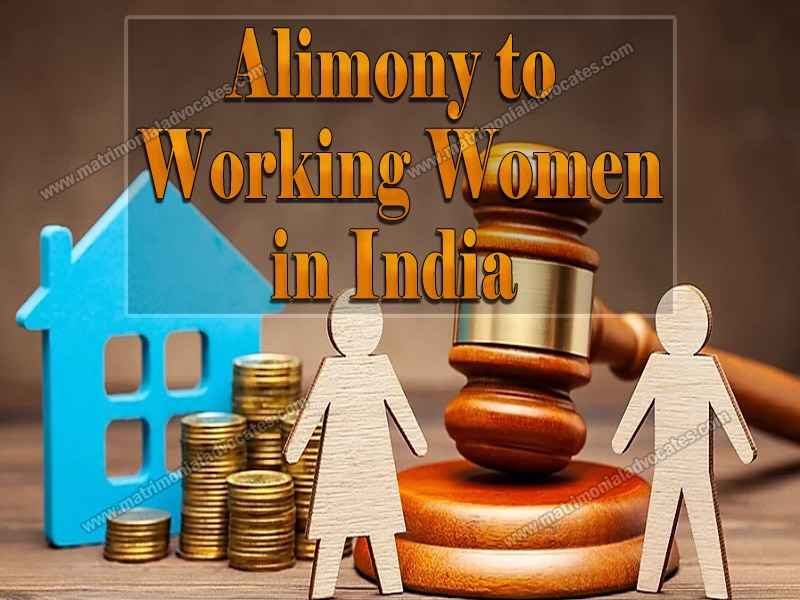
It is a settled law that when a woman (wife) is unable to maintain herself then she is entitled to get alimony. But what about women who are working professionals, are they entitled to get alimony and how is it decided if they have source of income? The present article is a discussion on this very question.
Before we discuss this we should know what alimony is and who is working woman?
ALIMONY
Alimony is an allowance made to one spouse by the other for support pending or after legal separation or divorce. In other words when a marriage ends, typically one party will need financial support from the other. Alimony is the legal obligation to make those payments.
WORKING WOMAN
When we say a working woman, we consider someone who is economically independent and financially able to satisfy her needs but sometimes in cases of married working women they do not earn enough to satisfy their necessities and partially depend on their husbands. These women are eligible to claim a certain amount of alimony.
Reason behind alimony to wife
The main reason behind maintenance to a wife is that a wife faces many problems after leaving her matrimonial home and is deprived of many comforts. So, the monetary comfort in the form of alimony gives her some consolation.
Alimony Laws in India
Laws related to Alimony are as such:
Section 125 of CrPC provides maintenance to the spouse: (SECULAR LAW)
The spouse can file a case on maintenance before the Court and after considering the income; assets and property of the spouse’s husband the Court will award or provide a proper maintenance to the spouse as per the requirement. An application for interim maintenance can be filed with help of the best divorce lawyers in India for getting interim relief irrespective to religion or caste. According to the circumstances of the case the court may grant maintenance to the required spouse.
Domestic Violence Act, 2005
Under this Act the spouse has the right to take back all the items or things given to her during her marriage and can also seek compensation or damages from the Court for any mental or physical cruelty suffered. For this, the court may appoint an officer to keep a check during the stay of the spouse in her father-in-laws house and report accordingly.
Section 24 of the Hindu Marriage Act allows both husband/wife to claim for maintenance whereas under Hindu Adoptions and maintenance act the women get an additional option. This act is applicable to Hindus only. Under the Hindu Marriage Act, 1955, there are two types of maintenance—interim or temporary, and permanent—that can be ordered by a court. The former, under Section 24, is the maintenance granted to a spouse during the pendency of court proceedings, while the latter includes permanent maintenance and alimony under Section 25. The maintenance does not include stridhan, which is the wife’s right. Also, the quantum of maintenance is decided by the courts on the basis of the husband’s financial income.
Accordingly, Muslim women can claim for Maintenance under Dissolution of Muslim Marriages Act, 1939 and the Muslim Women (Protection of Rights of Divorce) Act, 1986. Under this Act a husband may divorce his wife by repudiating the marriage without giving any reason. Pronouncement of such words which signify his intention to disown the wife is sufficient. Generally this is done by talaq. He may also divorce by Ila, and Zihar which differ from talaq only in form, not in substance. A wife cannot divorce her husband of her own accord as she can divorce the husband only when the husband has delegated such a right to her or under an agreement.
In Christians, The Indian Divorce Act 1869 deals with the alimony to be provided to the Christian women. Section 36 of the Act provides for alimony pendente lite similar to the provision of Hindu marriage act. A petition shall be served on the husband; and the court, on being satisfied of the truth of the statements therein contained, may make such order on the husband for payment to the wife of alimony pending the suit as it may deem just:Provided that alimony pending the suit shall in no case exceed one fifth of the husband’s average net income for the three years next preceding the date of the order, and shall continue, in case of a decree for dissolution of marriage or of nullity of marriage, until the decree is made absolute or is confirmed, as the case may be.
Section 38 of the Act provides that In cases in which the Court makes any decree or order for alimony, it may direct the same to be paid either to the wife herself, or to any trustee on her behalf which is to be approved by the court, and may impose any terms or restrictions which to the Court deems fit, and may from time to time appoint a new trustee, if it appears to the court relevant so to do.
ALIMONY TO WORKING WOMAN
With the change in time, the laws dealing with maintenance and alimony had changed and therefore a working woman in India is also entitled to alimony. A working woman is eligible to get alimony depending on her income and living conditions. So, even if the woman is working and there is a substantial difference between her and her husband’s net worth, she will still be granted alimony to provide for the same living standards as her husband’s. But if she is capable enough to survive a good life of her own and there is no substantial difference between the income of the wife and husband then court will take this into consideration and will decide the merits of the case accordingly.
Factors to be considered while granting alimony
- The position and status of the husband and wife,
- Whether the wife has an actual claim for maintenance.
- If the wife is living separately, whether the reason to do so is justified.
- The wife’s total property and income.
- The husband’s total property, income generated from this property, and his other income.
- The total number dependents and their expenses borne by the husband.
- The personal expenses of the husband.
There have been recent judgment whereby because of social changes where women are no longer dependent on their husbands or other family members, their pleas for alimony now need to be looked into with all facts, and it should be ensured that one of the spouses should not be enriched at the cost of the other.
The courts must factor in the wife’s status and lifestyle while fixing alimony to ensure that she lives in reasonable comfort considering her status and mode of life she was used to when she lived with her husband.
Therefore the amount of alimony to be paid cannot be fixed by law as it varies from case to case; the most important aspect is to maintain a balance while deciding the same. Should cater the dependent spouse with reasonable comfort as was given during the existence for their marriage and should not be repressive for the other spouse to provide the same.
In case of Chaturbhuj vs. Sitabai (2008)
It was held that wife can claim alimony even if she is earning .The Apex court in this regard has ruled that an estranged woman can claim maintenance from her husband in spite of her effort to earn monthly income if that is not enough for her maintenance. It further clarifies that the expression “Unable to maintain herself” does not require a wife to be absolute destitute before she can apply for maintenance.
In a case where the wife who was earning very less as compared to the husband it was held by the Delhi Court that the income of the wife is not enough to maintain herself , also considering the fact that her husband is earning far more than her. So, the wife is entitled to get alimony and the same level of life style she enjoyed at her matrimonial home
Though the Judiciary supports women in cases of maintenance, it does not overlook men. There are instances where the court has considered the earning capability of the woman and had refused to grant alimony.
Abdul Rahim Raheman Shaikh vs Saida Abdul Rahim Shaikh and Anr. (3rd January 2020)
In a significant ruling, the Bombay HC recently ruled that a husband can’t be asked to pay a high amount of maintenance if the wife earns more than him. The High Court accordingly, reduced the amount to be paid to a wife from Rs 1,000 to Rs 750.
In another case Bombay court held that a spouse who is well qualified to get service immediately with less efforts, is not expected to remain idle to squeeze out the other spouse by relieving him of his or her own purse by a cut in the nature of pendent lite (pending litigation ) alimony.
“The law does not expect the increasing number of such idle persons who by remaining in the arena of legal battles, try to squeeze out the adversary by implementing provisions of law suitable to their purpose,” the judgment further said.
In one Ruling of Calcutta High Court it was held by the court that an earning woman who has adequate financial resources isn’t entitled to maintenance from her husband. The salary of the woman was seventy four thousand per month .The High Court said that the salary of the wife was sufficient for her support.
CONCLUSION
Initially a misconception existed that a working woman cannot claim alimony. In fact she can claim for alimony if she doesn’t have sufficient income to sustain herself. This also depends upon her living conditions after the divorce. Where the wife is capable enough or earns more than husband than she should not get any alimony. So, on the basis of above discussion it can be concluded that the belief that a working woman can’t claim alimony doesn’t hold true. However this also doesn’t implies that she can get alimony in every situation.





